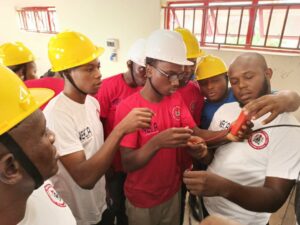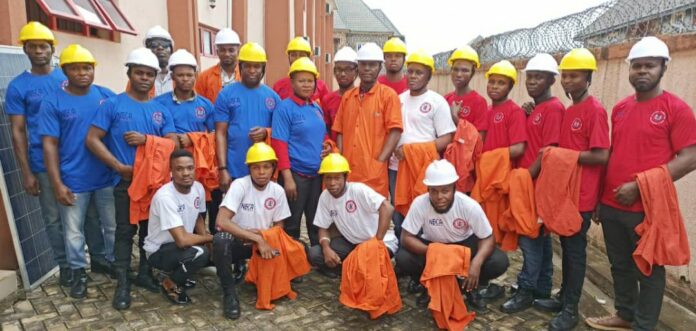The Area Manager of the Industrial Training Fund (ITF), Awka Area Office, Mrs. Gloria Ekwuruke, says graduates without jobs are finding hope in the skills development programmes of the fund.
According to Ekwuruke, one of such programmes is the ITF–Nigeria Employers’ Consultative Association (NECA) Technical Skills Development Project (TSDP), which is on-going nationwide.
Angel Network News (ANN) reports that
Ekwuruke while speaking on the TSDP, the Area Manager commended the commitment and resilience of trainees participating in the programme which she described as a practical tool for tackling unemployment in Nigeria.
The Area Manager said the training, which began on July 1, 2025, has equipped participants with both soft and technical skills that will empower them for self-reliance.
The four-month training ends in October with a graduation ceremony where trainees will showcase their project work.
“The training began with a month-long soft skills session, designed to introduce participants to workplace ethics, problem-solving, and entrepreneurial thinking before progressing to practical training.
“This year’s programme is focusing on three trade areas—domestic electrical installation and maintenance, sewing and garment cutting, and solar panel installation,” she explained.
“From the second month, trainees began in-depth technical sessions, and by the third month they had moved into hands-on practicals, applying theory to real-life projects.”
The trainees will from October 2 embark on final project work, which will be displayed during their graduation ceremony.
“The project is designed to confront Nigeria’s growing unemployment crisis, especially among graduates.
“Many of the participants are university graduates but without jobs,” she noted. “Through this programme, we are showing them that rather than remain job seekers, they can become job creators.
“Even if they don’t produce for the mass market, they can at least produce for themselves and their families, reducing dependency.”
She added that some participants in the tailoring class have already started making and selling clothing. Some of my staff wear dresses made by these trainees. This is a sign that the training is already yielding results.
“This is how unemployment is tackled—train one person, that person becomes productive and even trains others, removing more people from the streets,” she said.
The ITF Area Manager emphasized that technology integration is central to the programme’s success. “Trainees are taught how to use digital tools, smartphones, and even artificial intelligence (AI) to expand their productivity.
“In tailoring, for instance, I showed them how to use the internet to browse new styles and post their designs online to attract customers. Your shop cannot go everywhere, but technology can,” she said.
“For the electrical and solar installation trainees, mobile technology is used for troubleshooting and research. They can simply input a query into AI tools or browse modern wiring methods and equipment online. That knowledge keeps them competitive,” she added.
Ekwuruke cautioned that trainees who fail to embrace technology risk being left behind. “If you don’t upgrade, others who are more technologically inclined will get the jobs while you are sidelined,” she warned.
The programme, she said, goes beyond technical instruction—it reshapes attitudes. “From the first day, trainees are taught to think like producers rather than dependents. We tell them that salary is no longer enough to put food on the table; everyone needs a side hustle. These skills provide exactly that opportunity,” she explained.
Ekwuruke also serves as an instructor in the tailoring class. I use my own example to motivate participants. “When they see that even their Area Manager is hands-on in tailoring and producing, it inspires them. It drives home the message that no skill is beneath anyone.”
The ITF boss assured that support for trainees would not end at graduation. “We continue to monitor and supervise them after the training to see how they are applying their skills. Phones are not just for TikTok, Facebook, or WhatsApp—we drum into them that their phones must put food on the table.”
She added that continuous learning and upgrading are critical to long-term relevance. “Change is constant. What you learn today must be improved on tomorrow if you want to remain competitive,” she emphasized.
The project, which has been running for several years, is part of ITF-NECA efforts to provide Nigerians with employable and entrepreneurial skills.
By combining technical expertise with digital literacy and entrepreneurial training, the programme seeks to produce graduates who are adaptable, innovative, and able to contribute meaningfully to the economy.
Ekwuruke underscored the broader impact: “When one person becomes self-reliant, that person can employ others, reduce poverty in their family, and contribute to community development. This is how inclusive economic growth is built.”
As the October graduation approaches, the focus will be on how these trainees transform their newly acquired knowledge into businesses, innovations, and livelihoods that uplift themselves, their families, and their communities.









